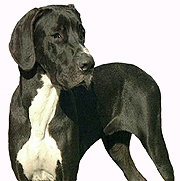Breed: Great Dane
Temperament: protective
Lifespan: 8 years
Maintenance: medium
Recommended for: active families with older children
"There is nothing like a Dame (Dane)…" the song goes, and a fully-grown Great Dane is an incomparable sight!
Appearance
One of the largest dog breeds in the world, the Great Dane can reach a minimum of 76cm (30") at the shoulder and weigh upwards from 54kg (120lb). It has a sleek, smooth coat in five colours, fawn, blue, black, brindle and harlequin. Within harlequins there are variations such as merle (grey-marle dappled with black), and Boston, mostly black with white socks and chest blaze.
Temperament
Great Danes are territorial and most will bark at strangers on their property, but once introduced, are friendly and affectionate. Owners say they are loving and loyal, and adore human company.
Health
Bone strength is vital for giant breeds such as Great Danes. Start with a balanced diet as puppies and stick to the diet sheet provided by the breeder. Deal only with a reputable breeder and make sure you see certificates with low-risk ratings for hip and elbow dysplasia, both inheritable defects causing degeneration of the hip or elbow. Heart problems are also found in some lines so have your puppy thoroughly checked out by a vet. Also, being a deep-chested breed they are vulnerable to bloat, so don’t exercise your dog immediately after eating or drinking.
Breeding
If you breed harlequins or merles together, about 25% of the puppies will either be born dead, or will have to be destroyed because they’ll be deaf or blind. In Germany, breeders are minimising the risks by breeding Merle to Bostons (those mostly black Danes with white socks).
Housepet potential
If you have the room Great Danes are good indoors, with little hair shed and usually content to stretch out on the floor or lounge, love lying at (or on) the feet of their owners. They are reliable guard dogs, and few thieves would risk jumping into the yard with a strange Dane! They are inclined to drool, on furniture, clothes, owners. Breeders say it will cost about $25 a week to feed an adult, and the end product is equally large!
Space, exercise & grooming
Adult Danes kept in suburban backyards will need a daily walk of 30 minutes. Many Danes are kept on acreages so will self-exercise. Do not over-exert pups as bone development can be affected. Danes require minimal grooming, although washing them can take some time! A 1.5m (5ft) fence should be adequate.
Ideal owner/training
Much of the success in owning a Great Dane will come with responsible ownership and attention to training. Control of this huge dog is essential at all times in all situations, and most experts say Danes respond well to training. Puppy school is an ideal introduction, and basic obedience is very important. They should not be allowed to jump up at people: it may be cute at six months, but at 24 months will be intimidating to strangers and children.
History
Despite their friendly attitude nowadays, Great Danes have a bloody history as bull baiters and hunters in centuries past. They are the national dog of Germany and have been patronised by the likes of Chancellor Bismarck and Buffalo Bill Cody.
National contacts
To find up-to-date contacts for breeders, contact the following organisations.
The Australian National Kennel Council (ANKC)
www.ankc.org.au
Dogs NSW
http://www.dogsnsw.org.au/breeders-directory
Email: [email protected]
Phone: 1300 728 022 (NSW only) or (02) 9834 3022
Fax: (02) 9834 3872
Dogs Victoria
http://www.vca.org.au
Email: [email protected]
Phone: (03) 9788 2500
Fax: (03) 9788 2599
Dogs ACT
http://www.actca.asn.au
Email: [email protected]
Phone: (02) 6241 4404 – Fax: (02) 6241 1129.
Dogs West
http://www.cawa.asn.au
Email: [email protected]
Phone: (08) 9455 1188
Fax: (08) 9455 1190
Dogs SA
http://dogssa.com.au
Phone: (08) 8349 4797
Canine Control Council of Queensland
http://www.cccq.org.au
Email: [email protected]
Phone: (07) 3252 2661
Fax: (07) 3252 3864
Tasmanian Canine Association
http://www.tasdogs.com
Email: [email protected]
Phone: (03) 6272 9443
Fax: (03) 6273 0844
Dogs NT
http://www.territorydogworld.com
Email: [email protected]
Phone: (08) 8984 3570
Fax: (08) 8984 3409
The Australian National Kennel Council (ANKC)
www.ankc.org.au



